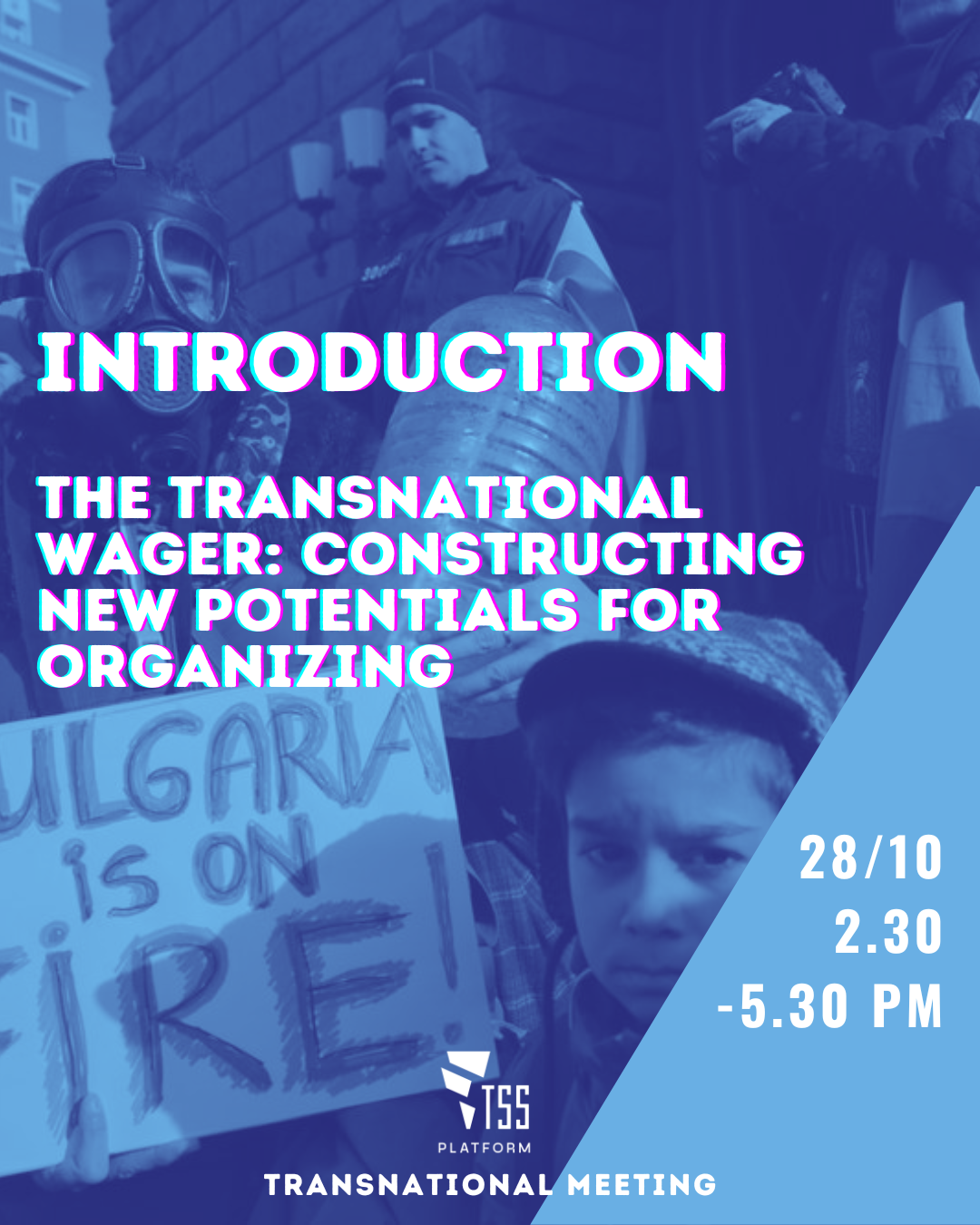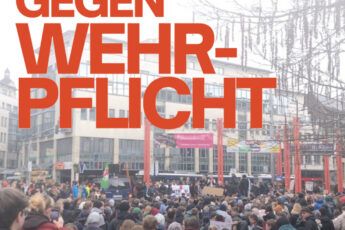
by TSS Coordination
Session 3 – The Transnational Wager: Constructing New Potentials for Organizing
Saturday 28th of October, 14:30-17:30, Porta Pratello, Via Pietralata 58
[Full meeting program here]
In this session we want to deal with the problem of transnational organizing by introducing some insights elaborated through discussions within the TSS coordination group. These insights represent more open issues and problems, rather than fixed positions: we know we are not all on the same page on this. Nevertheless, the scope of these notes is that of providing initial contents for a discussion aimed at making steps forward together. The goal is to share some elements of what transnational organizing can be, how it can be pursues and where it can lead us. The proposal to all participants, is to develop a collective thinking about transnational organizing as a possibility to enhance current struggles, and a wager through which imagine and enact horizons of struggle otherwise impossible to achieve.
Urgency and possibility of transnational organizing in the current conjuncture
As collectives and activists involved in the TSS Platform, we’ve been involved in different forms of action, from strikes to demonstrations to blockades, from mass civil disobedience to campaigns, from assemblies to pickets. But we acknowledge that current forms of mobilization have lost drive and have limited impact on the relations and structural issues underlying capital’s power on the reproduction of our lives and on the environment. This requires a collective search for more effective forms of initiative.
This holds particularly true in the current conjuncture, when war politics is imposing itself and hijacking political imagination. As TSS we have a specific space to deal with the war, the Permanent Assembly Against the War, but given the impact of the war we think important points should be raised. First: while we see the escalation in Gaza and in Israel’s project of colonizing Palestine, we don’t forget the war in Ukraine and the different places where war actions are being normalized for years. We see different contexts, but what is going on is an expression of a general situation. Second: As participants in the TSS process, we must keep avoiding being trapped in geopolitical readings of situations or being trapped in homogenizing alliances. Third: refusing the politics of war means we need to keep developing an alternative view on all this, including paving the way for an alternative path to express anger and the will of change which is based on collective strategies for liberation from oppression, exploitation, racism and patriarchy. Four: to be a real alternative to war politics, which reproduces the artifice of the nation and the state as identities erasing all social dimensions, this must be done on a transnational level.
This is what makes the issue of transnational organizing so urgent today: to be able to imagine a radically different path for struggles, where things are not compartmentalized, where issues are not sacrificed in the name of higher goals, where all we learned from years of expanding our political vision is not swallowed by the simplification of war politics, where peace can be a project of collective emancipation.
Situating organization among the subjects who struggle
Discussing about organization is not about how to decide, who is a spokesperson or a delegate, or who is a representative of what. For us, the discussion on organization and on transnational organizing is about how to build a collective force which can be effective in the current political reality, with the aim to transform it and erode the power of capital. We invite to think that the possibility to build this collective force rests on the capacity to build connections, political communication and strategic capacity between different conditions and subjects. How to develop and strengthen this capacity is the challenge of the TSS project.
The richness of experiences and initiatives of which all of us are protagonists is the background. Different forms of strikes, demonstrations, actions, riots happen and can ignite each other. Activists milieus are important in terms of what drives innovation and opens possibilities. However, we raise two points for discussion: first, we need to acknowledge that most of our actions have become less effective, and sometimes removed from class subjects. Second: we need to think about what we do as activists by widening our gaze on what ‘movements’ are. This means we need to be brave enough to refuse disillusion and face these issues by connecting what happens among activists with the conditions around us.
Too many times we’ve been stuck in discussions where the notion of ‘movement’ is conflated with that of organized groups, collectives, networks or trade unions. We want to look beyond that and look at the movements that crisscross society even when they don’t assume an explicit form. We want to look at the diverse and multifarious practices of refusal enacted by workers, women, migrants, lgbtqi+ persons, at the expression of needs and will that contain a radical critique of present conditions, at their capacity of autonomous organization. Women’s refusal of their supposed reproductive duties and to patriarchal domination, as well as migrants’ capacity to challenge the border regime are two of the most powerful manifestations of what we are talking about. To link organized movements with these movements within society is one of our collective challenges. This requires political analysis as well as to face the problem of the political direction of activist energy, and the capacity to assume collective priorities for strategic goals.
This means to rethink practices and forms of organizing and recast what we already know within different coordinates. In this sense, the organization we aim at is a political infrastructure situated among the subjects that organize–namely: workers and migrants, men, women and lgbtqi+ people–to strengthen their insubordination in a collective direction.
Transnational organizing as a concrete intervention in the everyday reality
We live in no ordinary times, war looms and everything is happening around us. While states and other entities pursue their war goals, different forms of anger pop up. Are we able to intervene in the present condition? When raising the point of transnational organizing, some questions often arise: do we work from our local practice and develop a transnational practice and organization from it? Or do we start from a completely transnational analysis and develop our local practice based on it? And how can local practices strengthen the transnational level? Or is this separation artificial and has to be broken? How to prevent local and national logics from shaping local organizing and struggles so that they oppose transnational organizing? What we propose is to think about the transnational perspective not as something that “replaces” local struggles or directly solves the problems of organizing locally, but as the most concrete one to face the pitfalls and limits we are facing and to find new possibilities to gain strength.
We use the world concrete to signal a perspective that is able to detect and articulate the whole net of processes that make up our everyday reality–such as the war, the climate crisis, finance, production networks, logistics, migrant movements–and the multiple experiences of dispersed people struggling in often unorganized ways. We see that different situations of exploitation and struggle have their own languages that often don’t talk to each other. What we must collectively do is to develop a discourse that allows these multiple languages to communicate with each other. This implies also a capacity to detect those languages of struggle that reproduce identities instead of fueling to the collective capacity to struggle.
For too many times we have confused the coming together with the federation of different groups and discourses around a lowest common denominator, starting from what we have in common. This approach may have proven successful in certain situations, but it’s time to realize that this will only lead us to search for similarities and try to overcome differences by putting them aside, limiting our actions to our community, our neighborhood, our workplace. And within them to try to erase the different conditions that mark them in the name of the need to converge around general common causes. We need to overcome this approach. If we want to have an impact and make steps ahead on the road of radical transformation of reality we need to connect with those who are different from ourselves, producing a communication, bridging worlds and histories.
Common thinking and common discourse against the splintering politics of capital
It is a specific politics of capital to weaken our collective opposition through fragmentation. Neoliberal policies constantly pressure to narrow our gaze on the closest spaces and experiences, including the national ones, as if these conditions were objective elements of our reality. The search for decisive leverage or single struggle is illusionary if we don’t constantly work to produce communication among the different conditions and subjects divided by capital and governance strategies. The production of such a communication requires the developing of common thinking and of a discourse that can shape this common thinking to coalesce differences into collective capacity.
How can we conceive political direction in this context? We need political direction, but political direction must not be confused with hierarchical directives. How can we organize and act together without reproducing structures of the past or bureaucratic machines? What is more important for the political direction we aim at is the sharing of goals, strategic perspectives, approaches to situations, claims when needed. Transnational political organization can be developed as a collective capacity to intervene in each and every context and situation to steadily grow political communication and a shared strategic perspective. Seen from this angle, transnational organizing can help us to address, in any specific situation and condition, the links and connections with other specific situations and conditions, in order to develop strategic thinking, communicate with others, find common grounds and allies.
The transnational social strike as a process and practice
We propose the transnational social strike as a strategic orientation for action. But what does transnational social strike mean? We understand it as a political process that can happen every day through a shared political practice of communication and through the constant political labor of understanding forms of resistance and insubordination that happen across society, often beyond the organized circles of activists, more than just a single event. The TSS is thus the name of a platform for local experiences, riots, strikes, insubordinations to meet. How effective this platform is, depends on how much we are able to manifest the determining influence of transnational processes and how effective is our work to reactivate in every context a communication between subjects who struggle.
For sure, whatever class means today, it is not something homogenous. Domination of capital fragments it and works hand in hand with other forms of oppression such as patriarchy and racism that divide the working class also within each locality or nation. As a consequence, there are today differences between rich and poor countries, different work sectors, different portions of capital, women and men, those who move and those who stay, etc. This increasingly involves also the production and reproduction of knowledge at any level, which happens along transnational lines, from schools and universities to factories and warehouses, from ports to public services, and is today a crucial field of struggle with students and workers at its core.
To acknowledge this reality means that we need to overcome visions that conflate differences within a blurry global condition, as well as those that lock up political imagination within local or national boundaries, thus suggesting some form of national homogeneity and separation, and the possibility to find solutions and attack capital through the leverage of the state. Albeit we are all inspired by historic internationalism, it is not possible to think our political organization starting from ‘national’ working classes. Looking at the transnational dimension is a way to face these limits and try to grasp the political reality of present times.
The strike as a tool and an organizational perspective
Lastly, the TSS proposes the strike as a tool of struggle and as an organizational perspective. We consider the strike in its widest meaning. Since the beginning of the TSS process, the strike has been the major form of expression of the refusal to submit to the valorization of capital and to the reproduction of the conditions for its domination over life and the environment. We have seen migrants’ strikes, women’s strikes, climate strikes. We have seen the social strike overflow into forms of metropolitan strikes and uprisings. And we are now witnessing the resurgence of labor strike in different forms: from general strikes to industrial ones, strikes are far from being consigned to the past. This also calls into question the role of trade unions, for their specific position in the organization of workers, and because trade unions are part of the landscape and composition of the TSS.
We know the trade unions reality is different among unions and between unions in different countries. However, we think some general issues can be pointed out. Even if strikes are happening almost everywhere, we are witnessing a problem for trade unions in dealing with wider political issues. With the war in Ukraine many trade unions have been trapped in geopolitical readings of the situation. Similar problems apply to the climate crisis, to patriarchal violence and to the impact of institutional racism in reshaping labor relations. This came not as a surprise, as we have seen unions struggling to deal with the transformation of work and class composition for decades, and engaging either in shop floor activity or in anti-government mobilizations very much focused on national reforms. In both cases, the organization of labor has lost ground to transformations in production, to the changing role of government and national negotiations, to the interlacing of production and reproduction in determining the balance of power. Attempts have been made to regain ground. As TSS we know from very close the experience of Amazon workers, as we hosted the first meetings involving German and Polish workers years ago. And we see today the capacity of trade unions to lead workers into fierce battles against major companies, such the big three automakers in the US.
However, we think that we cannot expect from trade unions to go beyond themselves and become something else. Trade unions are important tactical tools for every worker, as organizations they need to be involved in political discussions and mobilizations going beyond the negotiating table. Organizing workers is something different from what it used to be, because the condition of labor has changed, as well as what makes the class has changed. There’s a need to work with unions in order to bring their form of thinking and organizing closer to this reality and the transnational perspective, and union members can be involved in something different. We see the TSS platform as a political infrastructure where these crossings of organizational spaces can happen.
The TSS as a political orientation to rethink class struggle and revolution
This means that the TSS is not just the name of an organizational perspective, but contains also a political orientation. The TSS is a call to refuse to think about terms such as “class struggle” or “revolution” as a given, and to really dive into the multiplicity of the ways in which today subjects struggle against the grip of capital, of patriarchy, racism etc. The TSS is a collective political practice that identifies certain limits and poses the problem of how to counter and even overcome them. The TSS is social, because the struggle cannot be exhausted to one workplace, but has to do with the political conditions of exploitation (institutional racism, patriarchy, etc…) that produce a segmented and hierarchical form of production; because it takes production and social reproduction together including very different forms of refusal that interrupt the one and the other. The TSS is transnational, because it recognizes that this is the form – chaotic, contested, hierarchical – in which the chains of value and care are organized, in which living labor is reluctant to be governed and moves, in which normative frames are deployed to limit those movements, and in which we can dare to win again.





